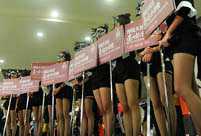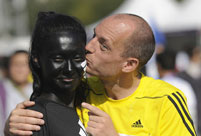Preparing for change
Hu Hongyang, vice-president of Nanjing Foreign Language School, one of eight foreign-language schools built in 1963 on the orders of then Premier Zhou Enlai to nurture China's future diplomats, said the policy is a sign of things to come and schools will inevitably cut the number of hours they devote to teaching English.
"The gaokao is still like the orchestra conductor's baton in most places in China," she said. "I have heard that some county-level schools are already considering cutting back on English classes in preparation for the new policies.
"Many provinces have spoken about lowering the status of English in the college entrance exam, but no one expected Beijing to do it so quickly and to be the first place to make the decision," she added.
According to the draft paper, English tests will be conducted every six months during the three years students spend in high school, with their highest recorded score used as the final mark.
The top score attainable in the national entrance exam will remain 750 marks, with the number available for the Chinese section rising to 180 from 150. Total marks available for social and natural sciences will rise to 320 from 300.
If implemented, the changes would have huge repercussions for the private education sector, according to Kevin Peter, a US citizen who's been involved in English-language education in Beijing for six years.
"I think it's a tremendous opportunity for schools and companies that provide content and learning beyond the traditional exam areas, such as grammar, vocabulary, idioms, things like that," said Peter, who manages a privately owned school.
"From the time of its foundation, the school has never seen learning English as a goal in and of itself, but also as a means of expanding the students' worldview and helping them to become more curious and think more creatively and independently."


 Low wages Indian migrant laborers
Low wages Indian migrant laborers Five fighters in flight training
Five fighters in flight training London mayor hails free trade, subway system on China tour
London mayor hails free trade, subway system on China tour Different eye catching shows at housing fairs in China
Different eye catching shows at housing fairs in China Special family portraits call attention to left-behind children
Special family portraits call attention to left-behind children Migrant children’s pain and joy in city
Migrant children’s pain and joy in city Lingerie show dazzles Wuhan Motor Show 2013
Lingerie show dazzles Wuhan Motor Show 2013  Running in fun customs at Beijing Int'l Marathon
Running in fun customs at Beijing Int'l Marathon  Weekly Sports Photos
Weekly Sports Photos Chinese riot police take Liberia peacekeeping mission
Chinese riot police take Liberia peacekeeping mission World has never been dark-- a blind kid’s life in Tibet
World has never been dark-- a blind kid’s life in Tibet Oriental education or western education?
Oriental education or western education? China in autumn: Kingdom of red and golden
China in autumn: Kingdom of red and golden U.S. Senate leader announces bipartisan deal
U.S. Senate leader announces bipartisan deal Chinese screen goddesses from Beijing Film Academy
Chinese screen goddesses from Beijing Film Academy Day|Week|Month